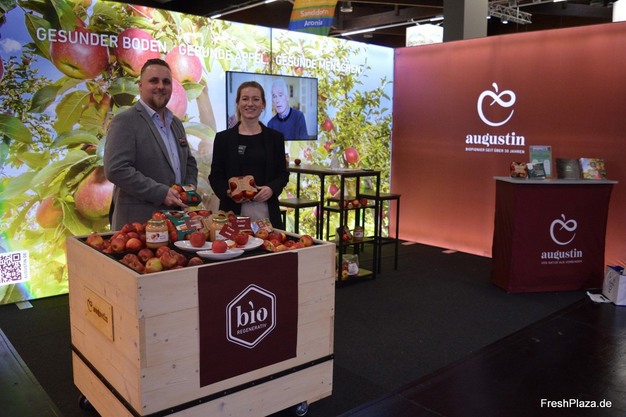The result of this year's top fruit harvest is rather sobering in large parts of Germany. This also applies to the organic apple harvest in the Altes Land region, as Hinrich Quast, managing director of Bio-Obst Augustin GmbH & Co. KG in Jork, tells us. "The total harvest is around 30 per cent below the level of the previous year, when the result was already slightly below average. Unfortunately, due to the early flowering and cold, wet weather, fertilisation of our plants was rather difficult."
However, this had a different effect on the individual varieties, emphasises Quast. "For the Jonagold group as a whole, we had to accept heavy harvest losses of up to 45 per cent compared to the previous year. We will miss these quantities, especially in late marketing. The Wellant variety, on the other hand, was the most affected, with losses of up to 80 per cent. Unfortunately, this has also led to stocks being sold out about two months earlier than usual." The same applies to the Boskoop variety, with a harvest loss of 60 per cent. By contrast, there were moderate to slightly lower yields of Elstar, Topaz and Braeburn.
Hinrich Quast during a company visit in spring 2023. For two years now, the family-owned company has had a brand-new sorting and packaging centre in the Jork industrial park.
The early vegetation led to a correspondingly early start to the harvest. After the last stocks from the old harvest had been cleared, there was a short marketing gap of around three weeks. At the beginning of August, the first early apples of the Delbarestivale and Deljonca varieties were harvested, two weeks earlier than usual. This year's harvest was already over by the second week of October. According to Quast, the qualities so far have been quite appealing. "This year, we have mainly harvested large-sized apples. Small-calibre apples, on the other hand, which are used as school fruit, for example, are few and far between. For the time being, we are also expecting good storage quality and few losses during storage, which is unfortunate for the industry."

Hinrich Quast and Catharina Augustin at this year's BioFach in Nuremberg.
Pleasing marketing situation
The marketing of organic apples started quite well this year. Quast: "Demand has been relatively high and stable until recently, but traditionally, towards Christmas, top fruit receives a little less attention, which is also reflected in lower demand. Meanwhile, I would rate the pricing so far as good and adequate. We started with quotations around 15 per cent above the previous year's level and have been able to maintain these prices more or less." The last phase of this year's season will be crucial. "Due to the aforementioned harvest losses within the Jonagold group, I expect the marketing season to end early by mid-May, which is two months earlier than in an average year. Due to the equally significant losses in western and eastern Germany, I also expect increased demand there from spring onwards and a generally receptive market."
Natyra stagnates, Freya and Deichperle grow
For more than 30 years, the Augustin company has been dedicated to the cultivation and distribution of regionally produced organic apples and markets the products of nine independently operating fruit-growing businesses in the Altes Land region. The range of varieties and cultivation capacities have always been adapted to changing consumer preferences. "Due to its susceptibility to rain spots, the Natyra variety is very risky in production in addition to its low yield potential, which in turn is due to the late harvest date at the end of October. Accordingly, we will not expand the acreage further. By contrast, the Topaz variety has become well established, which is why we are continuing to expand our growing capacity. Elstar is in slight decline due to the summer heat of recent years. In general, we are noticing that local cultivation is tending towards varieties from the Southern Hemisphere, so I am not ruling out the possibility that there will be more Gala or Braeburn in the Altes Land in the future."

The new sparkling apple juice is now offered together with fresh Demeter apples and apple purée as an overall concept at the PoS.
In recent years, the Augustin company has increasingly promoted the cultivation and distribution of the two innovative varieties, Freya and Deichperle. And not without success, according to Quast. "We have seen strong volume growth in both varieties, which in turn is due to the increase in young plants. Both varieties are becoming increasingly popular in the natural food trade and have already established themselves particularly well in the first half of the season up to February. Another newcomer to our portfolio since May of this year is the unfiltered sparkling apple juice, which is made from a blend of several varieties and is available in stores as a complete concept together with the fresh apples and the apple purée. This concept has also been very well received by consumers and is therefore a great addition to our basic range."
For more information:
Hinrich Quast
Bio-Obst Augustin GmbH & Co KGTel: +49 (0)4162-90018-21[email protected]www.augustin.de










